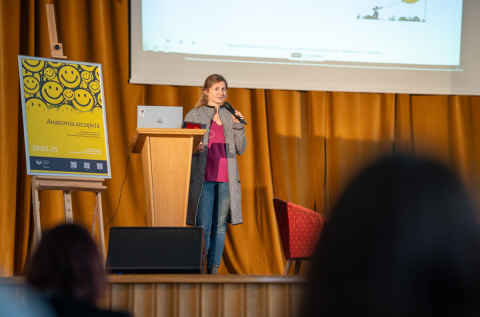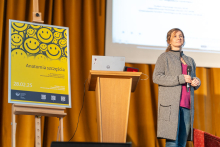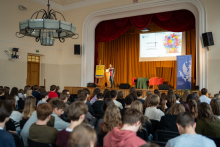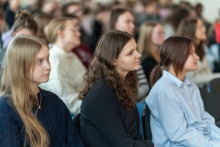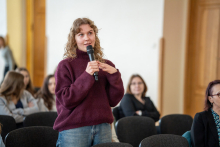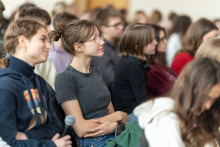Money, stuff and love don't actually give happiness?
At the beginning of the lecture, students rated on a scale of 1-5 the level of happiness brought to them by: things, money and love. The highest score was given to love, money and things - a score above average. However, research shows that neither things, money nor love bring long-term happiness. Why?
First, because our intuition fails us and we succumb to cognitive illusions: it seems to us that this is how it should be, that this is what we want, while in reality - not at all. Secondly, because we judge ourselves - or, more accurately, compare ourselves - against criteria that are often irrelevant. And as a result, we feel worse than we should.
- Depending on what reference points we create for ourselves, some things will give us happiness or not. Comparisons are very difficult and very harmful for us. And if we add social media to that, then it's very easy to build up reference points that are not healthy for us, and not even true. We only see a piece that someone wants to show, but it seems to us that everyone around us knows more, does more and achieves more - explained Dr. Magdalena Łazarewicz.
The third issue that affects happiness is hedonistic adaptation, that is the habituation, to both positive and negative experiences. Even love is subject to this process, which over time has a diminishing effect on the level of perceived happiness. However, research shows that we get used to various experiences much more slowly and not as easily as we get used to possessions.
- Therefore, if we are to invest in something, it is definitely in accumulating experiences not things. And in order to accumulate them in an effective way, you have to stop, “stay” in the experience, say to yourself: “how great that I am here, that I am doing this, that I can be with you” - Magdalena Łazarewicz stressed.
What to do to be happier?
This stopping and being in the experience is called savoring, one of the methods that positively affects our happiness level. Savoring should be done once a day for 8 minutes. Another method, to be used once a week for 5-10 minutes, is the so-called gratitude practice. This can be done, for example, by writing down five things, events, values, people for which you are grateful, or by collecting pictures of what you are grateful for in a special folder on your cell phone. And also by “sending” a kind email in our mind to a person or persons close and important to us.
- Relationship building is a factor that increases happiness levels. Happy people spend more time with others, have a richer social circle, and their relationships are more diverse, Dr. Łazarewicz explained - In addition to being in the company of people you like more often, go get into brief interactions with people you don't know. Such small talks, holding the door for someone or smiling at someone while shopping, which we consider insignificant, have a very good effect on our happiness level.
Equally important in building happiness is changing the reference points.
- If you're browsing social media and feel your thoughts start to turn toward comparisons, then you should tell yourself “STOP,” preferably out loud, and change the activity - the speaker argued.
Perhaps not surprisingly, but our happiness is also influenced by doing often something for others. And also having fun.
Top of the top: self-compassion
According to Dr. Magdalena Łazarewicz, this is one of the most difficult skills to teach, although very important in building happiness. It's an attitude that we show to ourselves in a crisis or situations when we have simply failed at something, such as passing a math test.
- Our lives don't consist only of pleasant events, nor can we avoid them. But when we have self-compassion, then in difficult situations, instead of running away, getting mad at ourselves, hiding our emotions, we are able to say to ourselves: “This is indeed a difficult moment, but it's also part of life, so how can I help myself?” It's like talking to a friend, to whom we won't say: “You're a dunce, you won't achieve anything,” but: “This is unpleasant. I can see that it's hard for you. Is there anything I can do for you?” Toward ourselves, unfortunately, we direct much harsher thoughts - Dr. Łazarewicz explained.
That's why you should work on cuddling your emotions instead of criticizing.
Practice makes perfect
The least impact on our level of happiness, only 10%, is what happens to us in life. When something sad happens, it will lower our happiness, but later it will return to the baseline level. It is estimated that 50% of our happiness level is driven by genes. Because of this, some people may experience episodes of, for example, depression more often than others, but the influence of genes is not necessarily decisive. Therefore, our actions, that is, the other 40%, are very important.
- The key thing about the exercises I mentioned is that doing them once or twice will not have a lasting effect. Happiness will not happen to us on its own. We need to work on it systematically. The mentioned exercises can be our conscious contribution to building our own happiness.
The presentation was followed by a discussion with the students. The lecture, titled “Anatomy of Happiness” by Dr. Magdalena Łazarewicz, was the first in a series of expert lectures scheduled in this edition of the MUW Patronage Program.
